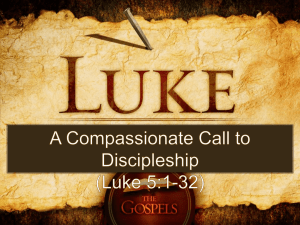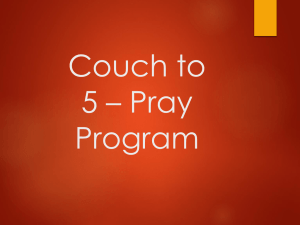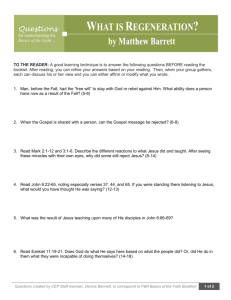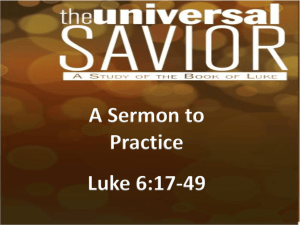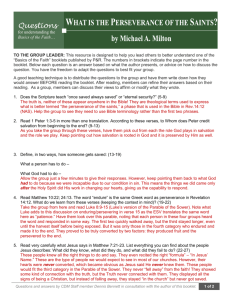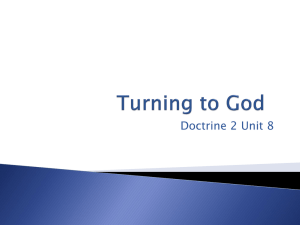Second Sunday of Advent All Saints' Church December 6, 2015
advertisement
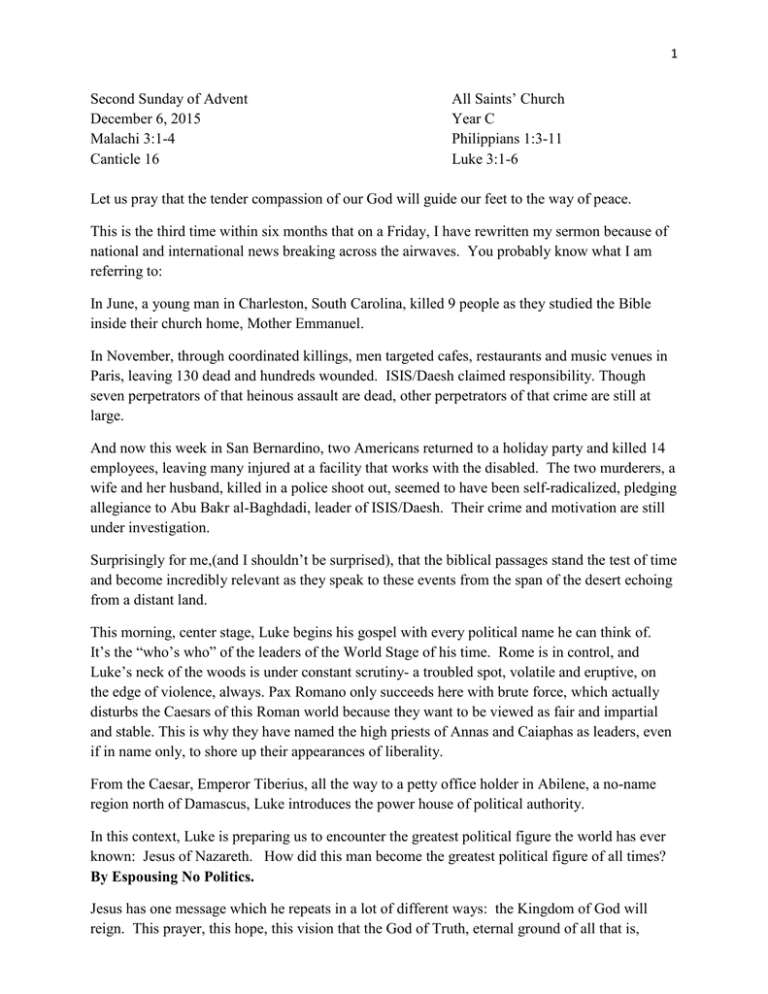
1 Second Sunday of Advent December 6, 2015 Malachi 3:1-4 Canticle 16 All Saints’ Church Year C Philippians 1:3-11 Luke 3:1-6 Let us pray that the tender compassion of our God will guide our feet to the way of peace. This is the third time within six months that on a Friday, I have rewritten my sermon because of national and international news breaking across the airwaves. You probably know what I am referring to: In June, a young man in Charleston, South Carolina, killed 9 people as they studied the Bible inside their church home, Mother Emmanuel. In November, through coordinated killings, men targeted cafes, restaurants and music venues in Paris, leaving 130 dead and hundreds wounded. ISIS/Daesh claimed responsibility. Though seven perpetrators of that heinous assault are dead, other perpetrators of that crime are still at large. And now this week in San Bernardino, two Americans returned to a holiday party and killed 14 employees, leaving many injured at a facility that works with the disabled. The two murderers, a wife and her husband, killed in a police shoot out, seemed to have been self-radicalized, pledging allegiance to Abu Bakr al-Baghdadi, leader of ISIS/Daesh. Their crime and motivation are still under investigation. Surprisingly for me,(and I shouldn’t be surprised), that the biblical passages stand the test of time and become incredibly relevant as they speak to these events from the span of the desert echoing from a distant land. This morning, center stage, Luke begins his gospel with every political name he can think of. It’s the “who’s who” of the leaders of the World Stage of his time. Rome is in control, and Luke’s neck of the woods is under constant scrutiny- a troubled spot, volatile and eruptive, on the edge of violence, always. Pax Romano only succeeds here with brute force, which actually disturbs the Caesars of this Roman world because they want to be viewed as fair and impartial and stable. This is why they have named the high priests of Annas and Caiaphas as leaders, even if in name only, to shore up their appearances of liberality. From the Caesar, Emperor Tiberius, all the way to a petty office holder in Abilene, a no-name region north of Damascus, Luke introduces the power house of political authority. In this context, Luke is preparing us to encounter the greatest political figure the world has ever known: Jesus of Nazareth. How did this man become the greatest political figure of all times? By Espousing No Politics. Jesus has one message which he repeats in a lot of different ways: the Kingdom of God will reign. This prayer, this hope, this vision that the God of Truth, eternal ground of all that is, 2 beyond space and time yet within them, transcending all things, yet pervading them, will become the greatest peril to this politicized world, a threat that will bring down an Empire. God’s reign will rule. Unexpectedly, Jesus is posing the most threatening message to rulers of his day because he believes in the power of God’s love, grace and will. Oh and by the way, he will die for this belief in God’s power, willingly so. This morning, entering stage left is John, son of Zechariah and Elizabeth. Zechariah tells us that his child will be called the “prophet of the Most High, who will go before the Lord to prepare his way, to give his people knowledge of salvation by the forgiveness of their sins…. the dawn of God’s compassion from on high will break upon us, to shine on those who dwell in darkness and the shadow of death, and will guide our feet into the way of peace.” John who never does what is expected; even his name is not expected, who surprisingly recognized the unborn Messiah from the womb of his mother (imagine John giving Jesus a fist bump from utero), is born into this hot bed of political power. In the face of that, he leaves his home and lives in the wilderness of the desert and claims NOT the advent of messianic power and deliverance, but rather of Repentance. Change your heart and your mind. Come purify yourself in the living waters. Your repentance is to turn away from the temptation that salvation will come from picking one Emperor over or against another. Rather choose the highway of God, which will lead you from exile to home. And the highway is being leveled as we speak. The salvation of God is at hand. Repentance is the way. To quote Bishop Rob, John is not interested in the pretty lights we put on out on the front of our homes, but rather he is rifling through our garages, our dark basements, our rooms that are piled with our junk in order to seek us out, to air out our dirty laundry, and to convert us to trust in God’s power and reign. It’s work. And, oh by the way, John the Baptist will die for this belief in repentance, willingly so. This morning, entering stage right, is Paul of Tarsus, a Jew, a Roman citizen, pulled off his horse on the way to Damascus, and converted by the living Christ to preach the Gospel of the Body of Christ, God’s kingdom within us. Paul is writing from prison to the Philippians, citizens of a powerful city, named after Philip, the father of Alexander the Great. Paul is incarcerated, enduring hardships, disgraced, facing death, suffering from his perpetual thorn in his side, and yet, also unexpectedly, he is full of joy, a heartfelt love for this community. Why? Paul should be defeated. Yet, he is buoyed up by his covenant with the Philippians, who have bonded with him, financially supported him, created a community with him which defied all boundaries (time, space, gender, race, religion, economic power) in order to preach the gospel that the Spirit of God resides in all of us. Oh and by the way, Paul will die for this belief that we are the Body of Christ, willingly so. Enter stage heaven, the glory of God shines, manifested by the angels from on high, and yet their focus is not on a king, but on a child, wrapped in swaddling clothes, lay in a manger, vulnerable, with no home, no power, no might, except he is God’s son, sent to save us. 3 In the midst of our apocalyptic prophecies from politicians, from our own turmoil, our own angst, and from murderous and heinous acts of evil, and from our own justified fear of terrorism, I think our Scripture this morning is asking one thing: what we are willing to die for? I don’t have an answer, fully formed, but I do think it has something to do with changing the way we think of power and to expect salvation to come from unexpected places. I want to close with one simple story that turned my early life as a teacher upside down, (to quote our Presiding Bishop- “which is right side up”)….unexpectedly so. My first year of teaching, I had the whole 11th grade class of the high school, about 150 students divided into 5 sections of around 30 students for each class. With a fluke of nature, the class was made up of 80% boys. I was 23. Controlled mayhem would be a fair assessment of my classes. In my mind the students were either jocks and cheerleaders, popular, sassy and entitled or trouble makers, obnoxious, mean-spirited and exasperating. I was pitted against these two groups, and given any week, one would dominate. I was caught in their power plays, victim to their wishes. My salvation came from Joseph, who fit neither category, and whom I had ignored as “insignificant.” Middle of the road student, neither popular, athletic, he was quiet, and not a player in the power dynamics I was caught up in with my students. I was unaware of how little I was seeing Joseph, and other students like him. We were acting out a play, written by Ayn Rand, January 16th, and I assigned him the role of judge because the role of judge did not have many lines. He wasn’t a great reader. To my surprise, unexpectedly, he transformed his “bit part.” He took it seriously; he dressed in an academic robe he had found in his grandfather’s closet, brought in a gavel. He entered from stage right: “All Rise,” as he commanded his class to stand when he came in. “Let’s do that again,” he said. And I swear he winked at me. We practiced it quite a few times, and Joseph was very aware of how he was getting the brats and the badly behaved to answer to his gavel. Joseph opened my eyes. I had cast myself into a fight and had missed seeing the power of love. This kid loved me; I didn’t deserve it. I had completely ignored him. “Here,” he said, “let me show you the way.” What did I learn: Don’t play their game. You will lose yourself. In fact, you are dying in that game. There are other things to die for: Trust in love. Define what real power is. And believe in the unexpected. Jesus gives us Love, John tells us to Repent, and Paul teaches us to trust in the body of Christ. They were willing to die for their beliefs so that we could know the way. Let’s follow them: It’s a wide highway, “every valley shall be filled, and every mountain and hill shall be made low, and the crooked shall be made straight, and the rough ways made smooth; and all flesh shall see the salvation of God.” (the Rev.) Jamie L. Hamilton

